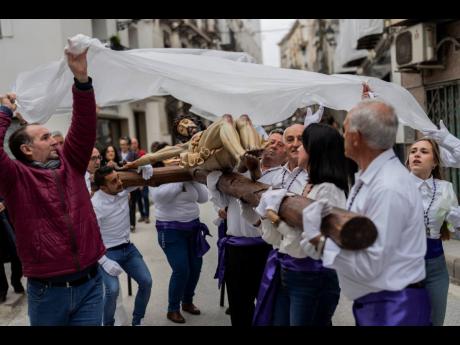Peter Espeut | Trying to build the Kingdom
Christians the world over are in the midst of their holiest season, when they celebrate the rising from the dead of their saviour, Jesus, the Christ. The public execution of their Rabbi and healer by the Roman imperial power was a profoundly traumatising experience for the Jewish men and women who knew him, but seeing him alive again, and putting their fingers into the wounds in his hands and side, shook their world. They would never be the same again!
As observant Jews under the heel of an oppressive occupying foreign power, they were expecting a new age of liberation and prosperity to dawn, such as they had experienced under David, their greatest king. A mighty warrior was he, leading a united kingdom of all the twelve tribes of Israel, conquering all the surrounding nations – and a great sinner; but he was a man after God’s own heart, not too proud to don sackcloth and ashes and do public penitence, and free enough to dance for joy before the Ark of the Covenant.
His death began a period of decline, when the Kingdom split in two, resulting in military defeat and exile. Jews lived in hope that a descendant of David would rise up, be anointed King, and – to use common parlance – chase those crazy bald-heads out of town. Many thought that Jesus was the anointed one (Messiah in Hebrew, Christ in Greek), for he had worked wonders, and had a large following; but his ignominious and bloody death shattered those hopes, and was unbecoming of one who claimed to be the son of God.
But his rising from the dead indicated that he was greater than David, for he had conquered death itself! The lamb of God had become the scapegoat, and had taken away the sins of the world. In Jewish theology, death (and sickness and suffering) was the result of sin, and cancelling sin meant an end to sickness and suffering and death; Jesus’ healing ministry – casting out demons (defeating Satan), healing the blind and the lame, and raising Lazarus from the dead (and Jairus’ daughter, and the son of the widow at Nain) – signalled that the world had changed, and had entered a new era.
GOOD NEWS
This was “good news”, and had to be spread to “all Judea, Samaria, and to the ends of the earth” (Acts 1:8) – from the land of the Jews to the land of the Gentiles, and to places as yet unknown, like Jamaica. Christians were given a Great Commission to go tell it on the mountain, over the hills and everywhere, that Jesus, the Christ, is born, and died, and is risen!
The Jews were God’s chosen people because he entered into a covenant with them – in the blood of bullocks, sprinkled on them (on the outside) by Moses in the desert (Exodus 24:3-8). The sign of that first covenant was circumcision (Genesis 17:10-14), and included dietary laws specifying what you can and can’t eat (Lev 11:1-47), and requiring rest on the Sabbath.
But God’s people broke that covenant, and with the new era came a new covenant (Matthew 26:28), this time in the blood of the Lamb of God himself – taken on the inside by people who drink of the cup and sign the New Covenant. Circumcision was done away with (Acts 15), all foods were declared clean (Mark 7:19, Acts 10:13-15, 1 Cor 10:25-27), and the day of rest for Christians became “the Lord’s Day”.
Christianity became a new religion – with Jewish roots, but separate. The laws given on Mount Sinai have been transcended by the ethics of the Sermon on the Mount (See Matthew 5-7). The Christian religion is about ethics – how one lives one’s life – and values – what one holds dear – but it is also about entering into a mystery, much deeper than humanity can comprehend. Serious Christians are driven (by the reality of the Christ event) to seek to build the Kingdom of God, a kingdom of peace and justice, of joy and liberation. The inevitable coming of this Kingdom is the punch line of the Good News.
EVANGELICAL RELIGION
And Christianity is an evangelical religion, meaning that its mission is to spread the Good News across the world to new places and new people. That motley crew of fishermen, tax-collectors, tent-makers, and poets travelled all over the Roman Empire and beyond spreading the Good News. And fifteen hundred years later it arrived in Jamaica.
According to the Pew Research Centre, in 2011 the number of Christians in the world was 2.2 billion (32 per cent), making it the largest religion in the world. Of those, 1.255 billion were Roman Catholics (51.9 per cent), probably surprising data for many Jamaicans, where Catholics are in the vast minority.
Six hundred years after Jesus, the prophet Mohammed founded Islam, another evangelical religion, and in 2011 there were 1.6 billion Muslims in the world (23 per cent). These two aggressively evangelising religious faiths – are in a struggle for the hearts and minds of the people of the world. Both owe their large following to alliances with secular powers, which have made one faith or another the national religion.
And so in this Resurrection Season we ponder on the progress of the world over the last 2,000 years and consider where we will be in 2033. How many have signed the New Covenant? And is the world any more peaceful and just than in past centuries?
Think on these things.
Peter Espeut is a development scientist and Roman Catholic deacon. Send feedback to columns@gleanerjm.com

